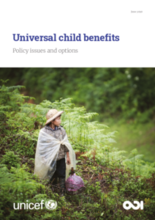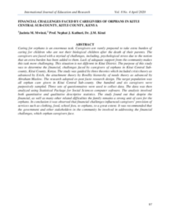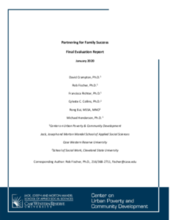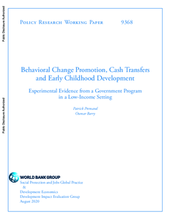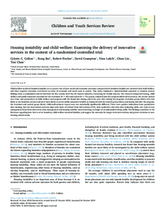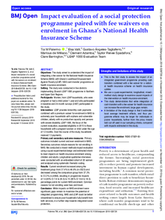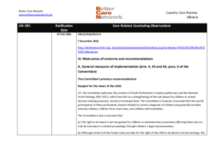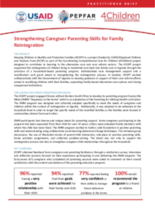Displaying 21 - 30 of 271
This report from ODI and UNICEF critically reviews the case for universal child benefits (UCBs). It seeks to contribute to a burgeoning and lively debate on the (potential) role of UCBs as a policy instrument in the pursuit of child poverty reduction and universal social protection.
The purpose of this study was to determine the financial challenges faced by caregivers of orphans in Kitui Central Subcounty, Kitui County, Kenya.
This study used wave 2 of the U.S. National Survey of Child and Adolescent Well-Being II (NSCAW II) to develop a new typology of kinship care based on financial mechanisms, including: (1) families that received Temporary Assistance for Needy Families (TANF) only; (2) families that received foster care payments only; (3) families that received both TANF benefits and foster care payments; and (4) families that received no payments.
This report presents the results of an evaluation of the Partnering for Family Success (PFS) program, which was conceived as an innovative intervention to address the particular needs of housing unstable families who had a child in the custody of the county child welfare agency.
The provision of material assistance, which is widespread in child protection settings, has received negligible scholarly attention. This article aims to describe and conceptualize this underresearched practice and to explore the challenges workers face when implementing it. The study described here included 20 in-depth interviews conducted with social workers working in an innovative Israeli child protection program called Families on the Path to Growth.
This paper disentangles the effects of behavioral change promotion from cash transfers to poor households through an experiment embedded in a government program in Niger.
This study employed a mixed-methods approach to examine process findings from a randomized control trial from the first county-level Pay for Success initiative, Partnering for Family Success.
This study aimed to understand the impact of integrating a fee waiver for the National Health Insurance Scheme (NHIS) with Ghana’s Livelihood Empowerment Against Poverty (LEAP) 1000 cash transfer programme - a program for extremely poor households with orphans and vulnerable children, elderly with no productive capacity and persons with severe disability - on health insurance enrolment.
This country care review includes the Concluding Observations of the Committee on the Rights of the Child and the Committee on the Rights of Persons with Disabilities. The Committees' recommendations on the issue of Family Environment and Alternative Care, and other care relevant issues, are highlighted.
This Practitioner Brief from the the Coordinating Comprehensive Care for Children (4Children) project presents key learning and recommendations from the Keeping Children in Healthy and Protective Families (KCHPF) project in Uganda, which supported the reintegration of children living in residential care back into family care through the provision of a household-based parenting program, individualized case management support and a reunification cash grant aimed at strengthening the reintegration process.

